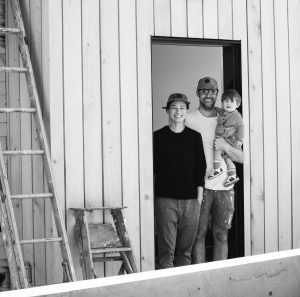The media’s portrayal of fathers isn’t doing dads any justice. Vickram Agarwal explains why the bumbling dad depiction is outdated and offers a look at the business opportunity of positive fatherhood representation.
[vc_row][vc_column][vc_separator][/vc_column][/vc_row]
[vc_row][vc_column][vc_column_text]
Imagine if Peter Griffin, Daddy Pig, and Homer Simpson were more like Harvey Specter from Suits. Suave and intentional—the kind of MEN you want to be. Or at least the kind of dudes you want to be around if you aren’t cool enough to be them. But they’re not. They are bumbling and uninspired—the butt of the joke.
They are dads after all. How could that life be aspirational?
Mainstream media is doing fatherhood no favors selling the dream. In fairness though, parenting is the farthest thing from glamourous. It is rewarding, but after a full day of “dadding,” I can’t think of anyone yearning to trade places with me.
When my daughter was born, I was in a position that allowed for complete involvement. I was fortunate not to miss a heartbeat. My wife and I shared the highs and lows, we tried together, we cried together. Unlike my better half, who had access to online resources, in-person workshops, and a community of like-minded mothers, I had no support system. There were no resources geared towards fathers, and no media-dad-superhero to look up to.
I am not looking for sympathy, but it is lonely when the world around isn’t cheering you on or dying to follow in your footsteps. I’m sure many dads feel the same.
I have been an entrepreneur for the better part of my life, so to me, that is where the opportunity lay. Necessity IS the mother of invention, and I used the problem of one to solve the problem of many. My unfulfilled needs birthed Daddy’s Digest, the father-focused parenting company I founded in 2018.
The experience of building a ‘left-of-center’ brand (I say this figuratively not politically), was eye-opening beyond the impact we were creating. The widely missed opportunity in addressing this neglected audience was and is hard to ignore. Every time messaging is created exclusively for a mother, it is a missed opportunity to speak to an involved father. The caveat here is that men don’t consume media in the same way as women do and content that resonates with one doesn’t always build favor with the other.
Of course, there is a justified argument of the risk of creating male-based family content—there isn’t the same guaranteed ROI we’ve seen historically with women-focused family content. This tends to be the same rationale used when building an argument against investing in accessibility, inclusion, and diversity. The need of many outweighs the need of the few because it isn’t good for business. However, based on data from the General Social Survey – Family there were 9.8 million mothers and 8.6 million fathers in Canada (including biological, adoptive, and step) in 2011. While the latest numbers aren’t available, the obvious (approximate) 1:1 ratio is a fair assumption for future years.
So, while Peter and Homer represent the systemic bias that drives the world view of fathers being peripheral, from a business perspective, when looking at the facts and disregarding their portrayal in mainstream media, fathers are not insignificant to the family dynamic. They can speak for 50 percent of the decision-making power in a heterosexual family and 100 percent in single-parent homes and same-sex marriages. I say “can” to acknowledge circumstances where decision-making is not equitable, active involvement is missing, or where cultural dynamics take precedence.
The argument to “put dads in ads,” as my wife would say, is strong and presents a growth opportunity for businesses and society at large. Creating more male-focused family content, information and resources is a chance to shift the paradigm and divorce ourselves of the perpetuating stereotype that fathers are comical, clumsy, and here for a laugh. Based on my experience with Daddy’s Digest, I can say with confidence that dads are capable, ready-to-be active members of the household. It is time that the media portrays them for what they are.
As someone who prides himself on being an involved father and with the added experience of building a parenting company, I can tell you with certainty that the tides are turning, and I am excited and optimistic for what is to come.
Illustration by Icons 8 from Ouch!
[/vc_column_text][/vc_column][/vc_row][vc_row][vc_column][vc_separator][/vc_column][/vc_row][vc_row][vc_column][vc_column_text]


In 2011, he founded Stroke Consulting, a Strategy & Digital Marketing Consultancy with a client portfolio that included brands like GMC, Chevrolet, Suzuki, Kawasaki, Fiat, Opel, and MasterCard. He currently leads the Black Rock Marketing Group as Partner & Managing Director in Toronto. In addition to being a business leader, he serves as an Advisor and Board Member to several non-profits.[/vc_column_text][/vc_column][/vc_row]













